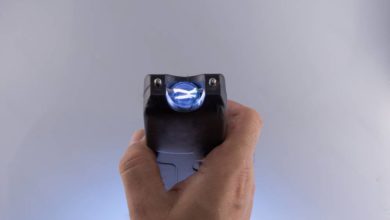Discover the Consequences of Inhaling Pepper Spray and How to Mitigate Its Effects
KEY TAKEAWAYS
Pepper spray is a popular self-defense tool used by individuals to protect themselves in potentially dangerous situations. It contains an active ingredient called capsaicin, derived from chili peppers, which irritates the eyes, skin, and respiratory system.
While pepper spray is effective in incapacitating attackers, it’s important to understand the potential consequences of inhaling it. In this article, we will explore what happens if you inhale pepper spray and provide insights into how to mitigate its effects. So, let’s dive in and gain a comprehensive understanding of this topic.
What Happens If You Inhale Pepper Spray?
Pepper spray is primarily designed to irritate the eyes and respiratory system, causing temporary incapacitation. When inhaled, its effects can be overwhelming and debilitating. Here are the key consequences of inhaling pepper spray:
Immediate Effects on the Respiratory System
When pepper spray is inhaled, it immediately affects the respiratory system. The capsaicin present in the spray triggers a response that leads to inflammation and constriction of the airways. This can result in difficulty breathing, shortness of breath, and even temporary asphyxiation in severe cases.
Irritation and Inflammation of Mucous Membranes
Pepper spray can cause significant irritation and inflammation of the mucous membranes lining the nasal cavity, throat, and lungs. This leads to discomfort, pain, and a burning sensation in these areas. The intensity of the irritation can vary depending on the concentration of capsaicin in the spray and the duration of exposure.
Breathing Difficulties and Coughing
As a result of the respiratory system’s inflammation, individuals who inhale pepper spray may experience breathing difficulties. The airways become constricted, making it harder to breathe normally. This can be accompanied by persistent coughing, which is the body’s natural response to clear the irritant from the air passages.
Temporary Impairment of Vision
Pepper spray is notorious for its effects on vision. When inhaled, it can cause temporary vision impairment, ranging from blurry vision to complete loss of sight for a short period. This occurs due to the irritation and inflammation of the eyes caused by the capsaicin. It is important to note that these effects are temporary and typically subside with time.
Burning Sensation and Discomfort
Inhaling pepper spray can result in a burning sensation and discomfort in the throat, nasal passages, and lungs. This intense sensation can be highly distressing, causing individuals to experience significant pain and discomfort. It is crucial to take immediate steps to alleviate these symptoms to ensure a faster recovery.
Potential Allergic Reactions
Some individuals may be more sensitive to capsaicin than others, leading to potential allergic reactions upon inhalation of pepper spray. These allergic reactions can range from mild symptoms such as itching, redness, and swelling to severe reactions like difficulty breathing, hives, or anaphylaxis. If you know you have allergies or are unsure, it is crucial to exercise caution and seek medical attention if necessary.
Psychological Impact
Apart from the physical effects, inhaling pepper spray can also have psychological implications. The sudden onset of pain, burning, and difficulty breathing can trigger panic, anxiety, and heightened stress levels. These psychological effects can further exacerbate the physical symptoms, making the overall experience even more distressing.
How to Mitigate the Effects of Inhaling Pepper Spray
If you find yourself in a situation where you or someone else has inhaled pepper spray, it is essential to take immediate action to minimize the effects. Here are some steps you can take to mitigate the consequences of inhaling pepper spray:
Move to a Well-Ventilated Area
Once exposed to pepper spray, the first step is to move to a well-ventilated area as quickly as possible. Fresh air helps dissipate the irritants and reduces the concentration of capsaicin in the air. If indoors, open windows and doors to facilitate air circulation and aid in the removal of the irritant.
Flush Your Eyes and Face with Water
If your eyes have been affected by the pepper spray, flushing them with water is crucial. Rinse your eyes gently with cool water for at least 15 minutes, ensuring that the water flows from the inner corner of the eye to the outer corner. This helps remove any residual capsaicin and provides immediate relief.
Avoid Touching Your Face
It is essential to avoid touching your face, especially your eyes, after exposure to pepper spray. Touching your face with contaminated hands can transfer the capsaicin to other areas, intensifying the irritation and prolonging the recovery process. Wash your hands thoroughly with soap and water to remove any traces of the spray.
Remove Contaminated Clothing
If any clothing has come into contact with the pepper spray, remove it as soon as possible. Contaminated clothing can retain the capsaicin, causing continuous exposure and prolonging the discomfort. Be cautious while removing the clothing to avoid spreading the irritant to unaffected areas.
Seek Medical Attention if Necessary
If the symptoms persist or worsen despite your initial efforts, it is crucial to seek medical attention. A healthcare professional can evaluate your condition, provide appropriate treatment, and offer additional recommendations for relief. They can also assess if there are any underlying issues or complications that require further attention.
Utilize Remedies to Relieve Discomfort
To alleviate the discomfort and expedite the recovery process, various remedies can be employed. These include rinsing the mouth with a mixture of baking soda and water, using saline nasal sprays or rinses to soothe nasal passages, and applying a cool compress to affected areas to reduce inflammation. Additionally, over-the-counter pain relievers can help manage pain and discomfort.
FAQs about Inhaling Pepper Spray
1. Can inhaling pepper spray cause permanent damage?
Fortunately, inhaling pepper spray typically does not cause permanent damage. The effects are usually temporary and subside with time. However, in rare cases or if an individual has pre-existing respiratory conditions, there may be a possibility of exacerbating the condition. It is always advisable to seek medical attention if you have concerns about your health.
2. What should I do if someone accidentally inhales pepper spray?
If someone accidentally inhales pepper spray, prompt action is crucial. Move them to a well-ventilated area, assist in flushing their eyes and face with water, and encourage them to breathe slowly and deeply. If symptoms persist or worsen, seek medical attention immediately.
3. Can wearing glasses or contact lenses provide any protection against pepper spray?
Wearing glasses or contact lenses may provide some limited protection against pepper spray. They can act as a barrier, preventing direct contact with the eyes and reducing the impact of the spray. However, it is important to note that they do not offer complete protection, and exposure to pepper spray can still cause discomfort and irritation.
4. Can pepper spray cause asthma attacks?
Pepper spray has the potential to trigger asthma attacks in individuals with pre-existing asthma or respiratory conditions. The capsaicin irritates the airways, leading to inflammation and constriction, which can exacerbate asthma symptoms. If you have asthma, it is advisable to avoid exposure to pepper spray and seek alternative methods of self-defense.
5. Is it safe to use pepper spray indoors?
Using pepper spray indoors is generally not recommended unless it is specifically designed for indoor use. The confined space and lack of ventilation can cause the irritants to linger in the air, increasing the risk of inhaling the spray and affecting bystanders. It is best to reserve the use of pepper spray for outdoor environments or well-ventilated areas.
Conclusion
Inhaling pepper spray can have immediate and distressing effects on the respiratory system and overall well-being. Understanding what happens if you inhale pepper spray and knowing how to mitigate its effects are crucial for personal safety and recovery.
By following the recommended steps, seeking medical attention if necessary, and utilizing remedies to relieve discomfort, individuals can effectively manage the consequences of inhaling pepper spray. Remember, prevention is always better than cure, so exercise caution and use pepper spray responsibly in self-defense situations.
Learn more about the rules of traveling with pepper spray to ensure your safety and avoid airport trouble by reading our blogs at Disability Help today.




